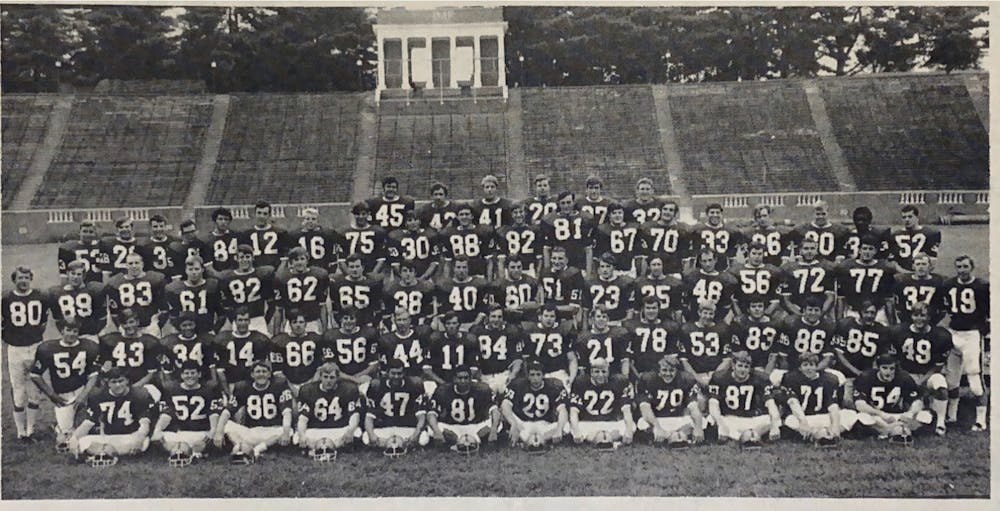We’re only 52 years removed from 1970 — the first year in Virginia Athletics history when Black athletes were given scholarships and spots on the football roster.
Harrison Davis, Stan Land, Kent Merritt and John Rainey all came to the University as freshmen in 1970 as the first four Black athletes with athletic scholarships. Gary Ham, a cornerback, also walked on to the varsity team that year, becoming the first Black player on varsity.
Davis joined the freshmen squad as a quarterback, Land as a defensive end and Merritt and Rainey as running backs. Coached by Al Groh, these four athletes came in with two objectives — win and get an education.
“We didn’t come in to change things,” Rainey said in a video feature from Virginia Athletics.
But change things they did.
Virginia was years late to integrate its football program compared to other colleges in the Atlantic Coast Conference and beyond, despite the surrounding Charlottesville area having a history of distinct Black communities like the Vinegar Hill neighborhood and business district. In 1916, Fritz Pollard, a football player at Brown, became the first Black player to compete in the Rose Bowl. Fast-forward to 1963 and many more Black players were suited up for various teams across the country and Maryland became the first ACC school with a Black player on its football team. Virginia was the last school in the entire ACC to integrate its athletic programs.
The late nature of Virginia football’s integration aligned with the larger, long-standing fight for integration and coeducation at the University. The first Black undergraduate student was only accepted in 1955 — 15 years before Davis, Land, Merritt and Rainey arrived on Grounds.
Throughout the 1960s, the University took steps to become fully integrated, though that did not stop lingering issues of racism that were prevalent for Black students. With white students still existing as the overwhelming majority in the student population, white supremacist ideology was still pervasive throughout the University community. This had real consequences for students at the time — these four players included.
These players remember hearing racial slurs coming from fans at football games, seeing the Confederate flag waving in the stands and hearing “Dixie” the unofficial anthem of the Confederacy, echo throughout the stadium. Outside of the game, things were no better. Davis recalls receiving hate mail from the Klu Klux Klan at times, and simply wanting to give up and go home — something his mother did not allow him to do.
These experiences were not easy, nor were they quickly forgotten. It helped that Davis, Land, Merritt and Rainey had the support of Groh, who believed all of his teammates had a lot more in common than they had differences.
“I wasn’t walking every step with these four guys,” Groh said. “So I understood that there are things that they’re going through that are not common to the usual freshmen experience.”
Groh’s empathy did not go unnoticed by these players. Even years after playing on the team in 2006, Land told the Roanoke Times that he has a “strong allegiance” to Groh.
Ultimately, what kept these athletes at the University was a desire to succeed. After playing on the freshmen team for its 1970 campaign, Davis, Land, Merritt and Rainey all moved up to the varsity squad where they stayed until the conclusion of the 1973 season. In those three seasons on varsity, the Cavaliers amassed an 11-22 record (6-12 ACC) and notched one win in 1972 against their rival, Virginia Tech.
This win, which came Sept. 16, 1972, was iconic — though it is often unremembered in Virginia football history. Davis was playing quarterback for the Cavaliers and struggled throughout the game, throwing “two interceptions off the bat,” according to Merritt. Per the usual culture of racism and white supremacy at the University, the Confederate flag was flying in the stands, “Dixie” was playing and the crowd was booing.
At one point during the game, Davis’ frustration got the best of him and he turned to the stands and held up his middle finger. The act, which Davis jokingly referred to as “Fingergate,” would end up becoming a turning point in the game because, shortly after, his team overcame a multi-score deficit and defeated the Hokies 24-20.
“We came back and beat them,” Merritt told The Virginian Pilot. “You couldn’t hear a peep from anybody.”
Although that was the last time these four Cavaliers were on the field together for a victory against Virginia Tech, that moment still lives on in their memories. Davis, Land, Merritt and Rainey would finish out the 1972 season and go on to play another in 1973 before graduating with their diplomas and moving on from the University.
“I wish that … we could’ve done more, but the reality is that we were doing something,” Land said. “We were proving, to all that would care to look, that we were capable of doing the academic work and performing on the football field and being successful at graduating from the University of Virginia.”
These four individuals all made history as Cavaliers and deserve immense recognition for enduring such adverse circumstances. Despite being thrown punch after punch and often feeling unwanted by members of the University community and beyond, they prevailed and shaped Virginia football history forever.







